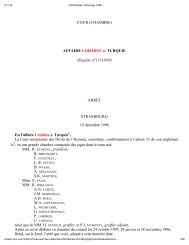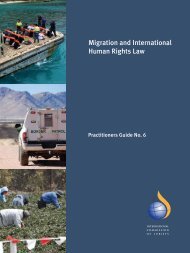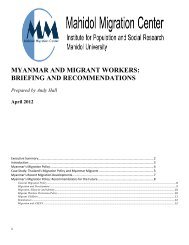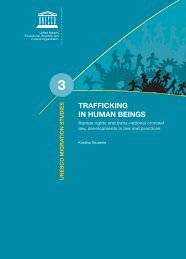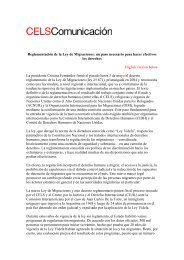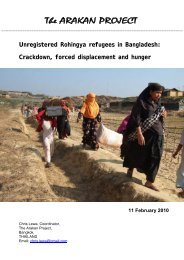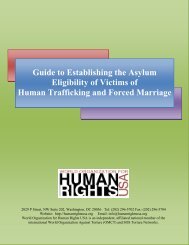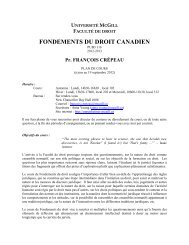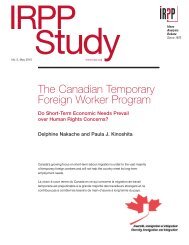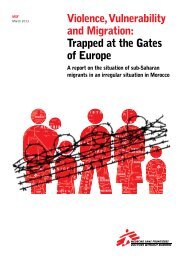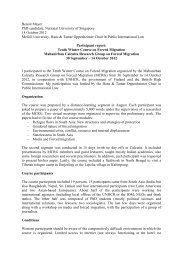Access to Justice for Migrant Workers in BC - West Coast Domestic ...
Access to Justice for Migrant Workers in BC - West Coast Domestic ...
Access to Justice for Migrant Workers in BC - West Coast Domestic ...
Create successful ePaper yourself
Turn your PDF publications into a flip-book with our unique Google optimized e-Paper software.
econstituted family struggles <strong>to</strong> adapt. Many caregivers experience family breakdown<br />
because of long periods of separation. One farm worker that the team <strong>in</strong>terviewed<br />
mentioned that he hated be<strong>in</strong>g away from his young child and wife and there<strong>for</strong>e preferred<br />
shorter SAWP contracts but the system prevented him from select<strong>in</strong>g employers.<br />
The Promise of Permanent Residence - Challenges faced by Live-<strong>in</strong> Caregivers<br />
A live-<strong>in</strong> caregiver’s ability <strong>to</strong> apply <strong>for</strong> permanent resident status is cont<strong>in</strong>gent on the<br />
successful completion of two years of authorized work with<strong>in</strong> the four years immediately<br />
follow<strong>in</strong>g entry <strong>in</strong><strong>to</strong> Canada (or 3,900 hours of work with<strong>in</strong> 22 a m<strong>in</strong>imum of 22 months). 86<br />
Most caregivers enter the LCP <strong>in</strong> order <strong>to</strong> ga<strong>in</strong> permanent residence <strong>for</strong> themselves and<br />
their immediate family members. Many caregivers recount <strong>to</strong> WCDWA how they work <strong>for</strong><br />
years <strong>in</strong> <strong>for</strong>eign countries <strong>in</strong> order <strong>to</strong> save enough money <strong>to</strong> pay broker fees <strong>to</strong> enter the<br />
program and many cont<strong>in</strong>ue <strong>to</strong> owe brokerage fees upon arrival <strong>in</strong> Canada.<br />
The promise of permanent residence and the urgency <strong>to</strong> complete the requirements of<br />
the program <strong>in</strong>creases the caregiver’s dependence on the employment relationship. Many<br />
caregivers tell WCDWA that they are will<strong>in</strong>g <strong>to</strong> endure bad employment situations so as <strong>to</strong><br />
complete program requirements more quickly. Many state that unemployment, f<strong>in</strong>ancial<br />
<strong>in</strong>security and the challenges of f<strong>in</strong>d<strong>in</strong>g a suitable employer are risks that they cannot af<strong>for</strong>d<br />
as the potential cost of the application <strong>for</strong> permanent residence.<br />
Long process<strong>in</strong>g times <strong>for</strong> new work permits <strong>for</strong> prospective employers also <strong>in</strong>crease<br />
anxieties about leav<strong>in</strong>g bad employment situations. Some caregivers <strong>in</strong><strong>for</strong>med the research<br />
team that they agree <strong>to</strong> take on the risk of per<strong>for</strong>m<strong>in</strong>g illegal work <strong>in</strong> order <strong>to</strong> overcome the<br />
f<strong>in</strong>ancial <strong>in</strong>security of be<strong>in</strong>g without work. Dur<strong>in</strong>g the long process<strong>in</strong>g times, many<br />
caregivers have difficulty ma<strong>in</strong>ta<strong>in</strong><strong>in</strong>g health <strong>in</strong>surance coverage and, if term<strong>in</strong>ated from<br />
their previous jobs, many also face challenges apply<strong>in</strong>g <strong>for</strong> employment <strong>in</strong>surance.<br />
The Promise of Permanent Residence – Challenges faced by ‘lower-skilled’ workers<br />
eligible <strong>for</strong> <strong>BC</strong> PNP<br />
In Part One, we reviewed the <strong>BC</strong> PNP program, not<strong>in</strong>g that it provides only limited<br />
opportunities <strong>for</strong> migrant workers <strong>in</strong> the NOC C and D categories. Similar <strong>to</strong> the LCP,<br />
applicants <strong>in</strong> the strategic occupations stream of the <strong>BC</strong> PNP have <strong>to</strong> complete a work<br />
requirement term, 9 months, be<strong>for</strong>e becom<strong>in</strong>g eligible <strong>to</strong> apply <strong>for</strong> a nom<strong>in</strong>ation. The<br />
permanent residence application is characterized as a ‘jo<strong>in</strong>t application’ between employer<br />
and employee. This means that the employee has <strong>to</strong> have an open-ended job offer from<br />
the employer throughout the immigration process which can take an average of 2 years <strong>to</strong><br />
complete. Like the LCP, the research team heard many s<strong>to</strong>ries of workers endur<strong>in</strong>g<br />
86<br />
IRPR s.113.<br />
36



